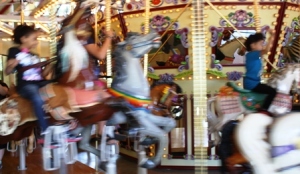I mentioned a couple of posts ago feeling overwhelmed, discombobulated, and like my head was full of static after returning from the conference last Monday. Actually I felt like that during much of the conference as well. Not overwhelmed in the sense of “I can’t handle this!” or “I don’t like this”, but overwhelmed with input — experiences, places, people, teaching, thoughts, activities. Much was packed into those five days and I’m not complaining at all, because it was fantastic, but I have been very aware this time of my need for processing it all.
I’ve written before of this sort of thing (archived here), quoting from a book I read a couple of years ago called The Introvert Advantage, by Marti Olsen Laney, PsD. It was the first time I’d heard of the introvert’s special “need for down time, solitude, time to sift and sort through all the things that have been deposited…”
According to Dr. Laney,
Right-brained introverts (I’m one)… require large amounts of protected sifting and sorting time because they take in so much unconscious information. Without private time they end up feeling confused and fragmented.
The more introverted you are, the more you need a serene environment for processing stimuli and for recharging. Why is processing time so crucial? Without it, you get information overload. New input lands on top of old imput, and suddenly your threshold is reached and you shut down. Crash. Circuits are jammed. Numbness sets in.
She compares this to a bank computer, accepting deposits, allowing withdrawals, processing thousands of different transactions, and temporarily putting them in some sort of electronic holding area as the day wears on. At night bank clerks handle them all in a “batch process”, so that in the morning everything is where it should be.
But what if, she asked, the bank computer didn’t operate at night? The result would be —
Serious congestion and backup. Accounts would be incorrect, your balance could be too high or too low. You wouldn’t be able to make sense of anything. Human beings are the same. If you dont’ have time to process the stimuli you take in, you get backed up and congestion sets in. You can get fuzzy or go blank.”
This is just what I’ve been experiencing over the last few days, not only because of all the things I saw, felt, thought and heard on the trip, but all the things that happened afterward. The house was in chaos, in part because of the replacement of the dishwasher, but also because there were so many things needing or waiting to be done: unpacking, laundry, dealing with stuff that had come up since I’d left, figuring out how to load and use the new dishwasher…
I’ve experienced the need to process this time, though, not just in the sense of feeling forgetful and discombobulated and like I have static in my head, but also in the way fragments of thoughts, disparate images, snippets of conversations from the weekend seem to drift randomly through my head. I want to grab hold of them, make sense of them, figure out what to do with them… but they’re gone, replaced by another before I can.
Suddenly I’m recalling the man walking his three huge dogs in the park, or me sitting with royal family in the almost empty restaurant on Saturday afternoon, or waiting at the terminal in the airport for my fellow travelers to debark after me, or the fantastic panorama of cloud and rain and mountain and shafts of light that we saw as we circled the airport in Tucson waiting for a thunderstorm to move on… they go on and on.
And that doesn’t even count the actual lessons taught.
There’s also the sense that all of this relates to my bigger picture, having to do with all the new stuff I’ve allowed into my life as potential “necessary” activities. I’d just about come to the conclusion before I left home last week that perhaps all these activities were not so needed after all. Now I wonder if I am literally incapable of doing everything I’m thinking I want/need to.
But so far there hasn’t been time to sort it out. Or perhaps I should say, I’ve not given myself the time to do so… So that is my plan for tomorrow.





